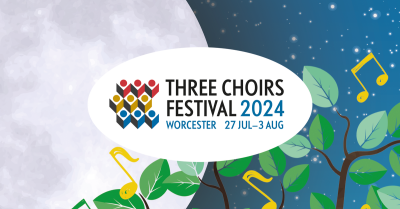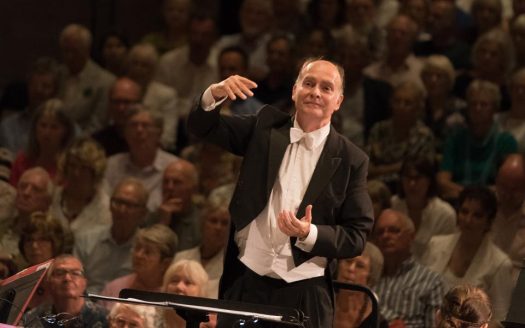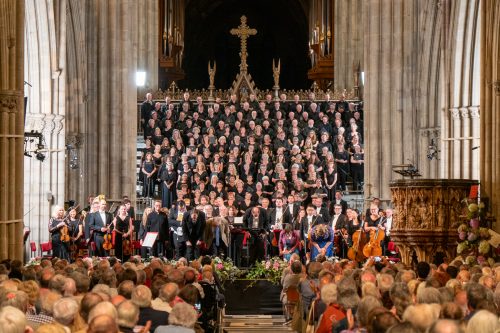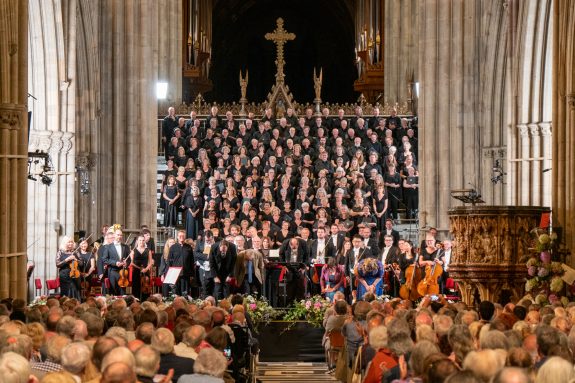
 United Kingdom Three Choirs Festival [7] – Elgar: Anita Watson (The Blessed Virgin – soprano), Rebecca Afonwy-Jones (Mary Magdalene), Toby Spence (St John), Alex Jones (St Peter), Three Choirs Festival Chorus, Philharmonia Orchestra / Adrian Partington (conductor). Worcester Cathedral, 3.8.2024. (JQ)
United Kingdom Three Choirs Festival [7] – Elgar: Anita Watson (The Blessed Virgin – soprano), Rebecca Afonwy-Jones (Mary Magdalene), Toby Spence (St John), Alex Jones (St Peter), Three Choirs Festival Chorus, Philharmonia Orchestra / Adrian Partington (conductor). Worcester Cathedral, 3.8.2024. (JQ)

Elgar – The Kingdom, Op.51 (1906)
In 2023, Adrian Partington, the Director of Music at Gloucester Cathedral, brought down the curtain on that year’s Three Choirs Festival in Gloucester with a fine performance of Elgar’s oratorio The Apostles. Normally, it is the prerogative of the Artistic Director of each Festival (the Director of Music at the host cathedral) to conduct the major concert on the opening and closing nights. Samuel Hudson duly opened the Festival last Saturday (review here) but tonight, in what seemed to me to be a very generous gesture, he invited Partington to close the 2024 Festival by conducting The Kingdom, the companion oratorio to The Apostles.
The Kingdom (1906) was Elgar’s third and last oratorio. It followed The Dream of Gerontius (1900) and The Apostles (1903). The Kingdom, which essentially centres on Pentecost as well as other events in the very early days of the Christian church, takes up where The Apostles left off and it shares a host of musical leitmotifs with that earlier work. Elgar planned The Kingdom as the central panel of a triptych, which would have been completed by a third oratorio, The Last Judgement, but he never seriously commenced work on that last enterprise. I first got to know The Kingdom in the early 1970s through Sir Adrian Boult’s magisterial EMI recording; I have loved it ever since and over the years I have had the good fortune to take part as a singer in a number of performances. The orchestration may not be quite as inventively colourful as in The Apostles but the scoring nonetheless shows Elgar at the height of his very considerable powers. The choral writing in The Kingdom is, I believe, even more exciting and rewarding to sing than in the other two oratorios.
Tonight’s performance featured a strong solo team. I may as well get my one disappointment out of the way at once. The tenor role of St John is the least prominent among the quartet. Though he was never less than reliable, I am afraid Toby Spence frequently sounded under pressure; more seriously, I listened in vain for any sweetness in his singing. To be honest I had expected more from this highly experienced singer. I don’t recall hearing mezzo-soprano Rebecca Afonwy-Jones before but I liked what I heard tonight. Her performance wasn’t completely flawless but the sound of her voice was consistently pleasing; her tone was warm and rich, yet this richness was not achieved through excessive vibrato, so clarity of words and voice were consistent features. I liked the sincerity of her singing and the way she communicated her passages of narration, especially the episode which opened Part IV. In the lovely music of Part II (‘At the Beautiful Gate’) both her voice and her expressive approach blended ideally with soprano Anita Watson.
Watson is another singer I believe I was hearing for the first time and if tonight’s performance is anything to go by then I hope to hear much more of her in the future. Hers was one of the best assumptions of the soprano role in The Kingdom that I have heard, whether live or on CD. I think her smiling demeanour helped; that smile was transferred into the sound of her voice. Like her mezzo partner, her tone and diction were clear throughout the performance, and I enjoyed every note she sang. She made an excellent contribution to ‘At the Beautiful Gate’ but she saved her very best for the great soprano aria ‘The sun goeth down’, which closes Part IV. In this extended number the soloist is required to produce a great deal of thoughtfully poetic singing, but rapturous singing is needed in the middle of the aria, as well as the ability for the voice to ride a large Elgarian orchestra in full spate. Watson was equal to all of these challenges and gave a really committed and very moving account of the aria. The subdued end was excellently achieved. I should also mention the Philharmonia’s leader, Zsolt-Tihamér Visontay who played the solo violin part in this aria with fragile beauty. Listening to him, I was reminded of the poetry that he brought to the slow movement of Elgar’s Violin Concerto during his superb performance of the work at last year’s Festival. ‘The sun goeth down’ should be a pinnacle of any performance of this oratorio. With superb singing from Anita Watson and the Philharmonia contributing with great sensitivity, her outstanding rendition of the aria was indeed a pinnacle.
We had a late change of soloist. Bass Alex Jones took the place of baritone Ross Ramgobin. Jones was only engaged last Monday – so he had less than a week’s notice – and after the concert I learned that he had never sung the role before. One would not have known, so assured and well-characterised was his singing. Jones is a former lay clerk at Gloucester Cathedral and an alumnus of the Guildhall School of Music. He is now pursuing a busy concert and operatic career. Less than three months ago I took part in a performance of Mendelssohn’s Elijah in which Jones took the title role. I was seriously impressed then by his singing which was imposing but also, when required, sensitive. However, this engagement was in a different league; not only was it a more prestigious occasion but Jones had had limited preparation time and, dare I say, Elgar’s music is more demanding than Mendelssohn’s, especially in such matters as a tricky entries and frequent tempo modifications.
I thought Jones gave a marvellous performance as St Peter. Early on, his solo ‘Men and brethren’ in Part I promised much; he sang it with authority and presence, both of which were characteristics of his performance over the work as a whole. His key solo comes in Part III with the extended monologue (‘I have prayed for thee, that thy faith fail not’). Jones was noble and eloquent throughout this long passage; his imposing physical bearing combined with his commanding singing meant that he was completely convincing hereabouts. He invested the words of this solo with real meaning and his singing had genuine presence. This was a very distinguished piece of singing. It is more usual to hear a baritone in The Kingdom; Jones is a bass, but the higher-lying elements of the part seemed to cause him no problems at all. Throughout, I thought his contributions were deeply impressive.
The choir is crucial to the success of any performance of this oratorio and the members of the Festival Chorus were on fire. The other works they have been tasked with singing during the course of the week have had their moments and have posed challenges; for this choir, however, Elgar was the real deal. This music is in their musical DNA and though they have sung very well all week, the levels of attainment and engagement now went up a notch. They served early notice of intent in Part I at ‘O praise the name of the Lord’, which was sung with conspicuous energy. Then, at the end of Part I they gave a magnificent rendition of ‘O, ye priests!’; their singing was really exciting. In Part III that wonderful tune at ‘He, who walketh upon the wings of the wind’ was proclaimed fervently by the gentlemen of the chorus. For me, though, the highlight of the choir’s evening came at the end of Part III. The entire closing section, after Peter has sung ‘Repent, and be baptized every one of you’, is great music by any standards. The Festival Chorus rose to the occasion with singing that was truly thrilling. I found the last couple of minutes genuinely stirring and, as a member of the Tenors’ Union, I hope I will be allowed to give a shout-out to the Festival Chorus tenors; their top Gs and As (on the word ‘glorified’) cut through splendidly, just as they should. Thought I have specifically cited instances where the choir was at full pelt, I must hasten to say that their soft singing was equally impressive. Thanks to clarity of diction, the choir’s words came over clearly; this was a performance full of text. Having sung the work a few times myself, I can attest that their attention to detail in all respects was outstanding.
The Philharmonia were on superb form. Elgar’s orchestration is rich, inventive and colourful and these players put across every aspect of the score with the expertise one would expect from them. When the orchestra was playing at full power the sound was truly impressive – though never overdone – and I was delighted to note that, due to Adrian Partington’s evident care over matter of balance, the choir was never overwhelmed. Just as impressive though, was the orchestra’s nuanced playing in the quieter episodes, such as the whole of Part II and the delicate little Prelude to Part IV.

The success of the performance flowed from the animated and insightful conducting of Adrian Partington. In 2010, he opened his first Gloucester Three Choirs Festival as Artistic Director with a performance of The Kingdom which he described then as his ‘favourite large choral work by Elgar’. That, I believe, was the first time I had heard hm conduct music by this composer and, looking back, I see that I expressed mild reservations about the swiftness of some of his tempi. In the intervening years I have become much more accustomed to Partington’s way with Elgar; tonight, I positively relished the urgency and drama that he brought to those passages which require such an approach. The Prelude set the tone; Partington began it with great dramatic thrust and at a swift pace but later on he brought out, by turns, the noble and poetic aspects of Elgar’s writing in this Prelude. From my seat I could see Partington’s conducting very clearly, it was obvious that he was galvanising his choir and conducting the orchestra very actively. He also kept a very watchful eye on his soloists, accompanying them understandingly. Like all of Elgar’s works, the score contains a multitude of small tempo modifications, inserted for expressive reasons; I doubt that even one of these tempo changes was overlooked. I had the distinct impression throughout the performance that the conducting came from the heart but was the work of a musician with a cool head.
The final section of The Kingdom (The Prayers) glowed warmly and brought the performance to a deeply satisfying conclusion. Over the years, I have attended a good number of performances of this oratorio, either to listen or to sing as a chorus member. I can honestly say this exceptional and moving performance was the finest live account that I have experienced.
And so, the 2024 Three Choirs Festival drew to a close. It has been an uneven week if I am honest; not all the repertoire choices have truly set my pulse racing. I have attended all but one of the main evening concerts and tonight’s was the only full house. I don’t think that suggests conservatism on the part of audiences – after all, the challenging BBC Singers programme was very well attended – but I am not sure that all the programmes struck a chord with the punters, especially at a time when wallets are under pressure. I had the sense that the programming was sometimes too driven by the theme of the natural world. That’s the danger of festival themes; they can act as a powerful stimulus, but they can also impose options on programme design. That is a subjective view, of course.
What I hope is less subjective is my view that at the concerts I attended the performance standards were uniformly high. We heard many excellent soloists. The Festival Chorus offered accomplished and committed singing, though I remain unconvinced that the programme consistently made the best use of these talented singers. The Festival Youth Chorus gave an outstanding concert. The Philharmonia vindicated the decision which the Festival took last year to extend the longstanding, fruitful partnership with the orchestra; the Philharmonia was on very fine form throughout the week. And congratulations are due to Samuel Hudson, the Artistic Director and his colleagues, Geraint Bowen and Adrian Partington. Not only did they prepare the Festival Chorus assiduously but all of them conducted their respective concerts very well indeed.
Geraint Bowen has announced the principal features of his appetising 2025 Hereford programme. Highlights will include substantial commissioned new works from Richard Blackford and Bob Chilcott. There will also be welcome recital appearances from James Gilchrist and Roderick Williams. Major vocal/orchestral works by Bliss, Handel, Howells, William Mathias and Mendelssohn will be included. There will also be a revival of a full-length oratorio, surely unknown to most people, by Samuel Coleridge-Taylor: The Atonement, premiered under the composer’s baton at the Hereford Three Choirs Festival of 1903. The Hereford Festival will take place between 26 July and 2 August 2025 and full details will be announced next Spring. I am already looking forward to Hereford 2025
John Quinn
